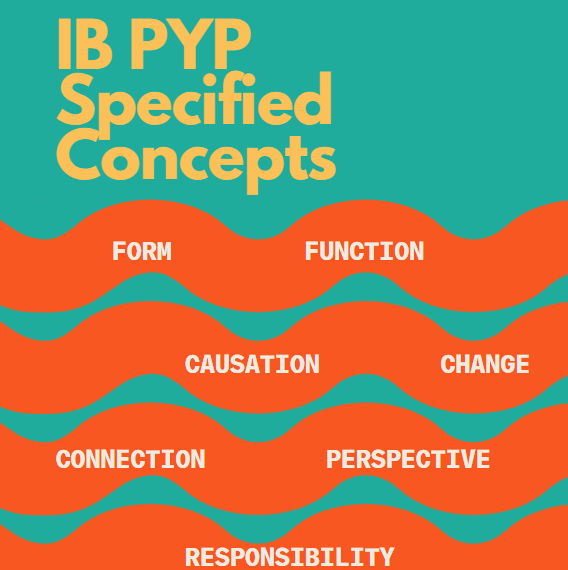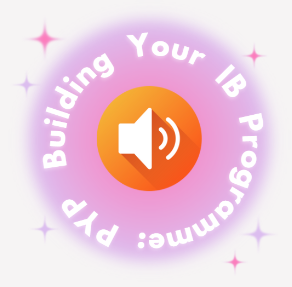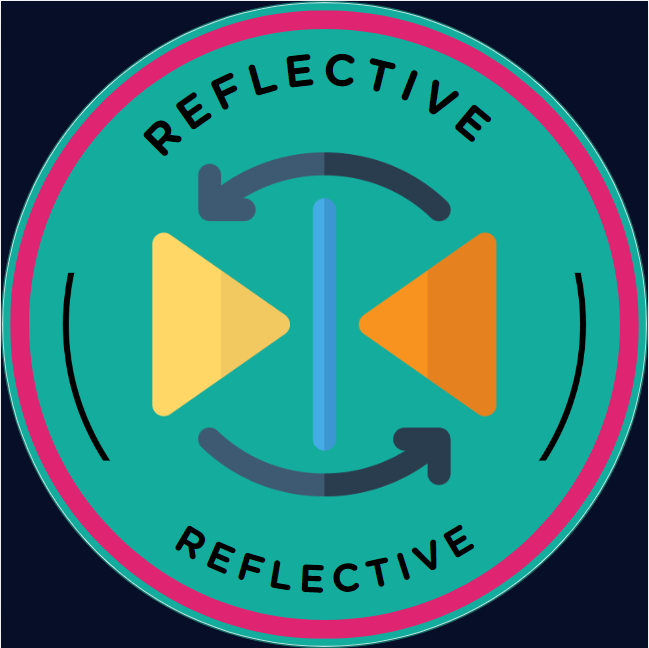The Extended Essay (EE) is one of three core components of the IB Diploma Programme, requiring students to undertake independent research and produce a substantial piece of academic writing. While students can choose any of their DP subjects to base their EE on, selecting one that aligns with their Higher Level (HL) subjects can be beneficial.
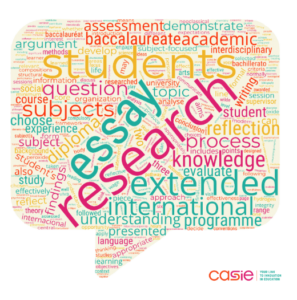
The EE involves conducting in-depth research on a specific topic and writing a longer essay than typical DP assignments. Students are expected to invest forty hours conducting detailed research about a topic of their choice and focusing on a well-defined research question that requires original inquiry. To achieve a high score, the research question should not be easily answered through existing knowledge or simple literature review. Instead, it should demand rigorous research, data collection, analysis, and comparison with other studies.
By completing the EE, students develop essential skills such as critical thinking, research, and writing and learn how to structure and present a research paper. These skills are invaluable for university studies and beyond. The process of researching, analyzing, and presenting findings can boost students’ confidence and prepare them for future academic endeavors. Additionally, the skills acquired through the EE can benefit students in their other DP subjects, improving their performance in written assignments and internal assessments.
Understanding the IB Extended Essay
Definition and Objectives
The Extended Essay is an independent task completed by all full DP students (it is optional for DP courses students), requiring the investment of 40 hours of in-depth research about a topic of their choice and based on a focused research question. The end products are an essay or research paper of not more than 4000 words written in any one of the DP courses studied by the student and a completed reflection form with a maximum of 500 words.
The Extended Essay is designed to cultivate advanced academic research and writing skills. Students independently investigate a topic of personal interest, guided by a qualified supervisor. This process culminates in a substantial, formally presented piece of writing. The essay challenges students to develop critical thinking, analytical reasoning, and effective communication skills as they explore their chosen subject, formulate a clear research question, and present their findings in a coherent and well-supported manner. Additionally, undertaking the Extended Essay supports the cultivation of the learner profile attributes.
The Extended Essay in the IB Diploma Programme
Similar to the other core components of the Diploma Programme, Theory of Knowledge (TOK) and Creativity, Activity and Service (CAS), the Extended Essay supports and is supported by the DP courses of the 6 groups. All three core components emphasize reflection, but the Extended Essay takes a unique approach by focusing on the research process itself. Students are encouraged to critically evaluate their decision-making, from the time that they choose a topic and the subject in which they will do their research until they complete their viva voce. This reflective process allows them to gain valuable insights into their own learning and problem-solving abilities.
Something worth noting, is that the grades for the Extended Essay and Theory of Knowledge are combined to determine bonus points for the Diploma Programme. A specific matrix is used to calculate the number of bonus points awarded, with a maximum of 3 points possible. However, to be awarded the IB diploma, students must score a D grade or higher in both their Extended Essay and TOK.
Importance of the Extended Essay
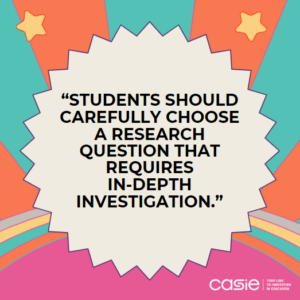 The Extended Essay allows students to develop four of the five approaches to learning skills, namely: communication, research, thinking and reflection. As the Extended Essay is an independent academic research work, research skill forms its foundation. Research and thinking skills are demonstrated in different ways: through the formal presentation of students’ work in the appropriate academic format, sifting through a plethora of published sources to identify relevant data or evidence to support their work as well as giving due credit to those whose work were consulted (demonstration of academic integrity).
The Extended Essay allows students to develop four of the five approaches to learning skills, namely: communication, research, thinking and reflection. As the Extended Essay is an independent academic research work, research skill forms its foundation. Research and thinking skills are demonstrated in different ways: through the formal presentation of students’ work in the appropriate academic format, sifting through a plethora of published sources to identify relevant data or evidence to support their work as well as giving due credit to those whose work were consulted (demonstration of academic integrity).
Skill Development
Though research and thinking skills seem the most obvious skills developed through the Extended Essay, students need to use their self-management skills to help them plan, implement and submit their Extended Essay writeup on time. For instance, students will have to organize their work, manage their time to meet all deadlines, keep persevering and showing resilience when met with challenges and most importantly practice self-motivation and mindfulness throughout the Extended Essay process.
Reflection is ongoing during the whole Extended Essay process. To decide on their topic and research questions, students reflect on what they know, their interest and what they have learnt through preliminary research. Once they have started with their study they constantly reflect on evidence gathered and data collected to decide on the next step. At the end of their research they reflect to evaluate their research and identify limitations and make suggestions for improvements. Hence, reflection forms an integral part of the Extended Essay.
Additionally, reflection is the only ATL skill that is specifically assessed through criterion E (Engagement) by using the Reflections on planning and progress form (RPPF). Through this form students document their reflection during the three reflection meetings. The student’s engagement with the research process and subsequent reflection on this experience are central to the assessment. This reflective component highlights the student’s intellectual and personal development, as well as the impact of this growth on the final essay.
Depth of Knowledge
The 40-hour commitment required for the Extended Essay underscores the depth to which students should explore their topic of interest and their research question. Students can choose to write their Extended Essay within a specific academic discipline or explore an interdisciplinary topic. For disciplinary essays, students must demonstrate their knowledge and understanding of the theories, methods, as well as tools and techniques associated with their chosen subject area. Conversely, those opting for a World Studies essay must showcase how an interdisciplinary approach deepens their comprehension of a significant global issue.
Students should carefully choose a research question that requires in-depth investigation, as selecting a well-documented or easily answered topic is unlikely to lead to a high grade. This involves devising a clear methodology, collecting substantial data, consulting reputable sources, conducting a detailed analysis, using valid arguments supported by evidence, comparing findings with existing research, drawing a conclusion, and evaluating the entire research process. The way these sections are presented in the Extended Essay allows the examiner to gauge the student’s depth of knowledge and understanding.
Preparation for University
The rigorous academic research and writing process provides students with invaluable preparation for university. By engaging in the Extended Essay, students develop the confidence and skills necessary to tackle challenging academic tasks, such as long written assignments, research projects, and dissertations. Additionally, the skills developed through the Extended Essay process are not only essential for tertiary education but also for future employment.
Personal Growth
Embarking on the Extended Essay journey is a transformative experience that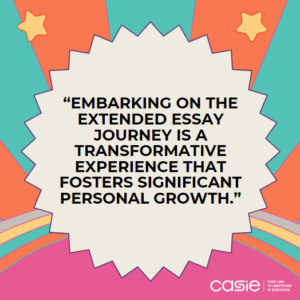 fosters significant personal growth. As students delve into their chosen topic, they develop essential skills such as critical thinking, problem-solving, and time management. The process of independent research and analysis cultivates intellectual curiosity and the ability to think critically. Moreover, overcoming challenges and setbacks along the way builds resilience, perseverance and the development of the Learner Profile. Ultimately, the Extended Essay empowers students to become independent learners, equipping them with the tools to succeed in higher education and beyond.
fosters significant personal growth. As students delve into their chosen topic, they develop essential skills such as critical thinking, problem-solving, and time management. The process of independent research and analysis cultivates intellectual curiosity and the ability to think critically. Moreover, overcoming challenges and setbacks along the way builds resilience, perseverance and the development of the Learner Profile. Ultimately, the Extended Essay empowers students to become independent learners, equipping them with the tools to succeed in higher education and beyond.
Recognition
The Extended Essay is recognized worldwide, with some universities offering course credits for achieving a grade of B or higher. It underscores the student’s ability to conduct independent academic research, carefully select relevant resources, and produce a well-structured research paper. These qualities are highly valued by universities as they indicate the student’s readiness to undertake a university-level dissertation.
Choosing the Right Topic For Your Extended Essay
Choosing the right topic is crucial for a successful Extended Essay. To select an appropriate topic, students should consider their personal interests, the topic’s relevance, and its feasibility within the given timeframe and resource constraints. The topic should be broad enough to allow for in-depth exploration but specific enough to focus the research.
It is important to avoid topics that are overly narrow or well-documented, as these may limit the scope of research and the potential for original analysis. A good topic should provide the scope for students to develop a well-crafted research question that necessitates extensive research (approximately 40 hours) to arrive at a meaningful conclusion.
How to Write an IB Extended Essay
The journey of the Extended Essay begins with meticulous planning and organization. Creating a detailed outline is crucial to structure the research and writing process effectively. This outline should include key sections, headings, and subheadings, providing a roadmap for the essay. It is essential for students to discuss this outline with their supervisor to gain approval and ensure that the format aligns with the subject-specific requirements of the Extended Essay.
As the research progresses, students should remember to continuously refine and update their outline. This dynamic approach ensures that the essay remains focused and coherent. Writing should be an ongoing process, allowing students to develop their ideas gradually and avoid last-minute rushes.
To maintain clarity and accessibility, it is important to use a simple language and explain complex technical terms. Additionally, students are strongly advised to incorporate in-text citations as they write to avoid accidental plagiarism and strengthen the credibility of their research. By following these guidelines, students can lay a solid foundation for a successful Extended Essay.
Introduction
The introduction section of the extended essay should provide an overview of the topic to establish the context of the research within the chosen subject. This should lead to the research question, which should be clear and concise and crafted as a question. Next, depending on the subject, either a strong thesis statement should be presented to outline the main argument or point of view, or a hypothesis can be stated (relevant for Mathematics, Sciences and Economics) to indicate the expected outcome. Finally, the introduction should conclude with an outline of the essay’s structure, guiding the reader through the subsequent sections.
Body
The body of the Extended Essay is where students present their research findings and analysis. This section should demonstrate a deep understanding of the subject matter through accurate use of terminology and effective analysis of the research question. Students must clearly outline their research methodology, including the sources used and the specific methods employed to collect and analyze data. By presenting evidence and using critical thinking skills to evaluate the information, students can develop strong arguments that support their thesis. The structure of the body will vary depending on the subject area. For example, Biology Extended Essays often include sections such as literature review, methodology, results and analysis, and discussion and evaluation.
Conclusion
The conclusion is a crucial component of the Extended Essay. It should effectively summarize the key findings and arguments presented throughout the essay, and restate the research question. A strong conclusion will also address any unresolved questions or limitations encountered during the research process, and may suggest potential avenues for further investigation. While students might draw conclusions throughout the essay based on their analysis and evaluation of the evidence gathered, it is essential for the Extended Essay to have a final, summative conclusion at the end. This conclusion must relate to the research question posed.
Appendices and Bibliography
The appendix and bibliography are essential components of the Extended Essay, but they must be placed correctly and used judiciously.
The appendix, if included, should be placed after the bibliography. Inserting the appendix/appendices before the bibliography is marked down as a weakness in the presentation of the essay. It may contain supplementary material that supports the main body of the essay but is not crucial to understanding the core argument. This might include raw data tables (as is often the case for science or mathematics Extended Essays), survey questionnaires, or interview transcripts, consent form, external mentor form, etc. However, it is important to note that key information, such as the research methodology or analysis, should not be relegated to the appendix. If this happens, the score for the corresponding assessment criteria will be negatively impacted.
The bibliography, on the other hand, should list all the sources cited in the essay by using a consistent referencing style. Additionally, for online sources, it is crucial to include the date of access. By following these guidelines, students can ensure that their Extended Essays are well-structured, well-referenced, and meet the high standards of the IB.
Research and Resources
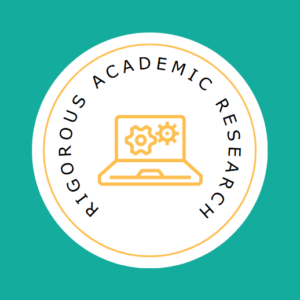 Thorough research, involving a careful selection of both primary and secondary sources, is fundamental to a strong Extended Essay. Primary sources, such as firsthand accounts, surveys, interviews, or experimental data, provide direct insights into the research topic. Secondary sources, including scholarly articles, books, and documentaries, offer interpretations and analyses of primary sources. Evaluating the credibility and reliability of these sources is crucial to ensure the accuracy and validity of the research. By carefully selecting and analyzing sources, students can strengthen their arguments, mitigate bias, and enhance the overall credibility of their Extended Essay. Additionally, meticulous organization and proper citation should be practised to avoid plagiarism and maintain academic integrity.
Thorough research, involving a careful selection of both primary and secondary sources, is fundamental to a strong Extended Essay. Primary sources, such as firsthand accounts, surveys, interviews, or experimental data, provide direct insights into the research topic. Secondary sources, including scholarly articles, books, and documentaries, offer interpretations and analyses of primary sources. Evaluating the credibility and reliability of these sources is crucial to ensure the accuracy and validity of the research. By carefully selecting and analyzing sources, students can strengthen their arguments, mitigate bias, and enhance the overall credibility of their Extended Essay. Additionally, meticulous organization and proper citation should be practised to avoid plagiarism and maintain academic integrity.
Writing and Revision
The writing and revision process is a crucial aspect of the Extended Essay. Students should begin drafting early (writing should be taking place on an ongoing basis as work on the Extended Essay progresses), allowing ample time for multiple revisions. These revisions help to identify areas for improvement in terms of clarity, coherence, and argumentation. Self-assessment, using the Extended Essay assessment criteria, is another valuable strategy to ensure that all aspects of the criteria are addressed. Meticulous attention to grammar, style, and formatting is essential for a polished final product. By following these guidelines, students can produce high-quality Extended Essays that showcase their academic abilities.
Understanding the grading criteria
The five assessment criteria for the Extended Essay are:
- Criterion A: focus and method (6 points)
- Criterion B: knowledge and understanding (6 points)
- Criterion C: critical thinking (12 points)
- Criterion D: presentation (4 points)
- Criterion E: engagement. (6 points)
While the same five criteria are applied to all Extended Essays, their interpretation varies depending on the subject area. The IB Extended Essay Guide provides specific guidance (under subject specific guidance for each subject) on how to apply these criteria to different subjects. Students should have access to the subject specific guidance for the subject in which they are writing their Extended Essay to ensure that their work aligns with the subject specific interpretation of those criteria.
Each assessment criteria is divided into:
- mark bands that indicate the mark range
- strands which highlight what is being assessed and under each strand a few indicators are listed which describes how the strands can be demonstrated.
Examiners determine the appropriate mark band for each strand (by scoring each indicator) and then use a best-fit approach to assign a final grade for that criterion.
Some tips to meet each criteria at the highest band:
Overall, the 4000-word limit for the Extended Essay provides ample opportunity for in-depth research and analysis. Students who fully utilize this word count are more likely to produce comprehensive and insightful essays. Conversely, essays that significantly underutilize the word limit may lack the depth and detail necessary to achieve a high score. Therefore, aiming for a word count between 3500 and 4000 words is generally recommended.
in-depth research and analysis. Students who fully utilize this word count are more likely to produce comprehensive and insightful essays. Conversely, essays that significantly underutilize the word limit may lack the depth and detail necessary to achieve a high score. Therefore, aiming for a word count between 3500 and 4000 words is generally recommended.
Criterion A:
- Choose a research question that is specific enough to allow for in-depth exploration within the word and time constraints of the Extended Essay.
- The research question chosen should be relevant to the student’s interests and the subject area.
- A research question that can be answered solely based on existing DP course knowledge should not be pursued for the Extended Essay.
- Refer to literature while explaining the topic and setting the context of the research. This adds credibility to the research focus chosen.
- Justify the sources and method used.
Criterion B:
- Source materials accessed should be relevant, credible and appropriate to the research question and effectively referenced and incorporated into the body of the essay in a way that demonstrates the student’s understanding (conceptual understanding).
- Prioritize sources that are reliable and predominantly from acknowledged sources (especially for science Extended Essays).
- Demonstrate understanding by paraphrasing and summarizing information from sources rather than relying solely on quotations. Excessive use of quotation should be avoided.
- Define technical terms clearly and concisely, especially when used for the first time. Students must demonstrate an understanding of these terms by using them correctly and accurately within the context of the essay.
- Respect consistently the convention for writing symbols, units and names throughout the essay.
Criterion C:
- Discussion should connect the data and evidence gathered to the research question with well-integrated references.
- An effective and focused argument should be developed based on the research, with the conclusion directly reflecting the evidence presented and addressing the research question.
- In essays exceeding 4000 words, the discussion, evaluation, or conclusion may fall outside the word count limit. As examiners only read up to the 4000-word mark, these crucial sections may be overlooked, negatively impacting the overall score for Criterion C.
Criterion D:
- All components related to the presentation of the Extended Essay should be present, namely the title page, the table of content, page numbers, and bibliography.
- All graphs, tables and charts should have an overall title/caption as well as relevant labels and units.
- There should be consistency in decimal points or significant figures of data collected (science and mathematics Extended Essays).
- Data tables that run over several pages tend to break the flow of the essay and hence should be placed in the appendix with a sample of the data table included in the text.
- Tables should be strictly used to tabulate data collected and not to circumvent the word count.
- Footnotes should not be used to explain technical terms, as these will be added to the word count. Only reference related material should be included in footnotes.
- Use a consistent citation style (e.g., APA, MLA, Chicago) to cite sources within the text.
- Use a consistent format for headings, subheadings, and paragraphs.
- Create a comprehensive bibliography listing all sources cited in the essay.
Criterion E:
- Reflections should demonstrate both personal and intellectual engagement as well as should have a strong evaluative component.
- For personal reflection, students should consider their choices, justifying their decisions and evaluating their effectiveness. They should also discuss skill development, challenges faced, and the advice sought from experts.
- For intellectual engagement students should assess whether their data and evidence support the hypothesis or thesis statement, evaluate the relevance of the collected data, consider alternative approaches (methods or sources) and suggest potential improvements.
IB Extended Essay Examples
The IB’s repository of Extended Essays (available for different subjects on its Extended Essay website) provides a valuable resource for students and supervisors alike. By analyzing both high-scoring and lower-scoring essays, students can gain insights into the expectations and standards of the assessment. Successful exemplars offer models of effective research methodologies, strong argumentation, and clear writing styles. In contrast, lower-scoring essays can highlight common pitfalls, such as weak thesis statements, insufficient evidence, or poor organization. By learning from both types of examples, students can improve their own work and produce high-quality Extended Essays that meet the rigorous requirements of the IB diploma programme. Hence, Extended Essay supervisors are encouraged to share Extended Essay exemplars (good and bad essays) with the students they are supervising.
Overcoming Common Challenges
“To get through the hardest journey, we need to take only one step at a time, but we must keep on stepping.” Chinese Proverb.
Despite the fact that the Extended Essay may look like a mammoth task, that perspective definitely changes as students create a plan for the completion of the Extended Essay wherein the whole research is broken down into smaller chunks each with their own interim deadlines. Students can then enter these interim deadlines on their personal calendars (to generate reminders) and ensure that they work consistently and respect those interim deadlines. This approach ensures that students are not overwhelmed by having to write a whole Extended Essay within a few weeks, but rather they build their essay over a stretch of time (usually several months to one year). There will be time that progress in the research would be minimal due to various challenges, yet students will have to keep persevering and use all their problem-solving and creative thinking skills to find solutions or find ways to work around the road-blocks they are facing. To summarise, the key to completing the Extended Essay on time is to create a plan and to follow it to completion by practicing proper time management and by persevering.
Students would also benefit by keeping track of all the literature sources they are consulting for their Extended Essay and to continuously add their in-text citations and update their bibliography. Waiting for completion of the Extended Essay and then try recalling or searching for sources used to add in-text citation or update the bibliography is a practice that may lead to violation of academic integrity. Whenever in doubt about how to correctly reference a source, students should reach out to their school librarian or supervisor for help. Students are expected to have a clear understanding of what is considered as academic malpractice and to always give due credit to authors whose work are being referenced in their Extended Essays.
Conclusion: Embarking on Your IB Extended Essay Journey
The Extended Essay is less about the final product and more about the transformative learning journey students undertake. It offers a unique opportunity for students to delve deeply into a subject of their interest, fostering independent research, critical thinking, and effective communication skills. This process encourages further exploration and research, ultimately leading to academic and personal growth, intellectual curiosity, problem-solving abilities, and a lifelong love of learning.


